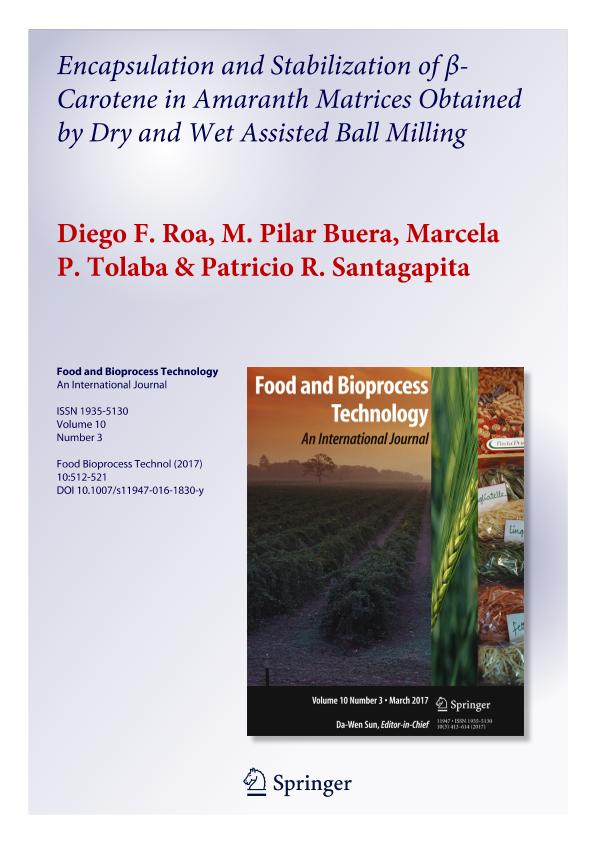Mostrar el registro sencillo del ítem
dc.contributor.author
Roa Acosta, Diego Fernando

dc.contributor.author
Buera, Maria del Pilar

dc.contributor.author
Tolaba, Marcela Patricia

dc.contributor.author
Santagapita, Patricio Roman

dc.date.available
2018-09-17T16:53:02Z
dc.date.issued
2017-03
dc.identifier.citation
Roa Acosta, Diego Fernando; Buera, Maria del Pilar; Tolaba, Marcela Patricia; Santagapita, Patricio Roman; Encapsulation and Stabilization of β-Carotene in Amaranth Matrices Obtained by Dry and Wet Assisted Ball Milling; Springer; Food and Bioprocess Technology; 10; 3; 3-2017; 512-521
dc.identifier.issn
1935-5130
dc.identifier.uri
http://hdl.handle.net/11336/59877
dc.description.abstract
Amaranth starchy fractions have recently awakened interest from the industry, mainly due to its potential functional characteristics. The encapsulating efficiencies of starch-enriched fraction (SEF) and native starch (NS) obtained, respectively, by dry and wet assisted ball milling were studied. The effects of high impact milling, gelatin addition, and storage temperature (5–45 °C, 45 days) on the retention of β-carotene were investigated. Significant effects of both milling and amaranth protein present in SEF matrix on emulsification and subsequent retention of β-carotene were found. Ball milled SEF matrix showed the best encapsulation performance, with up to three times of total β-carotene content in comparison with the NS-containing matrices. Degradation of surface and encapsulated β-carotene followed a first-order kinetic model and was strongly influenced by storage temperature. The activation energy of surface β-carotene degradation doubled that of encapsulated β-carotene (86 vs. 48 kJ/mol, respectively). This difference indicates that encapsulated β-carotene is more stable to temperature changes than surface β-carotene and revealed the protective capability of the SEF matrix even at high temperatures. The color coordinates a* and L* for samples stored at 25 and 45 °C positively correlated with the remaining β-carotene, revealing the potentiality of color measurement as an adequate index of β-carotene retention. The starch-enriched amaranth fraction modified by high impact milling showed a high technological potential as an encapsulating agent and its own protein content served as a good emulsifier-stabilizer.
dc.format
application/pdf
dc.language.iso
eng
dc.publisher
Springer

dc.rights
info:eu-repo/semantics/openAccess
dc.rights.uri
https://creativecommons.org/licenses/by-nc-sa/2.5/ar/
dc.subject
Amaranth Flour
dc.subject
Amaranth Starch
dc.subject
Encapsulating Agent
dc.subject
Planetary Ball Milling
dc.subject
Thermal Degradation
dc.subject
Β-Carotene
dc.subject.classification
Otras Ciencias Químicas

dc.subject.classification
Ciencias Químicas

dc.subject.classification
CIENCIAS NATURALES Y EXACTAS

dc.title
Encapsulation and Stabilization of β-Carotene in Amaranth Matrices Obtained by Dry and Wet Assisted Ball Milling
dc.type
info:eu-repo/semantics/article
dc.type
info:ar-repo/semantics/artículo
dc.type
info:eu-repo/semantics/publishedVersion
dc.date.updated
2018-09-14T13:16:00Z
dc.identifier.eissn
1935-5149
dc.journal.volume
10
dc.journal.number
3
dc.journal.pagination
512-521
dc.journal.pais
Alemania

dc.journal.ciudad
Berlin
dc.description.fil
Fil: Roa Acosta, Diego Fernando. Consejo Nacional de Investigaciones Científicas y Técnicas; Argentina. Universidad de Buenos Aires. Facultad de Ciencias Exactas y Naturales. Departamento de Industrias; Argentina
dc.description.fil
Fil: Buera, Maria del Pilar. Universidad de Buenos Aires. Facultad de Ciencias Exactas y Naturales. Departamento de Química Orgánica; Argentina. Universidad de Buenos Aires. Facultad de Ciencias Exactas y Naturales. Departamento de Industrias; Argentina. Consejo Nacional de Investigaciones Científicas y Técnicas; Argentina
dc.description.fil
Fil: Tolaba, Marcela Patricia. Universidad de Buenos Aires. Facultad de Ciencias Exactas y Naturales. Departamento de Industrias; Argentina
dc.description.fil
Fil: Santagapita, Patricio Roman. Universidad de Buenos Aires. Facultad de Ciencias Exactas y Naturales. Departamento de Industrias; Argentina. Universidad de Buenos Aires. Facultad de Ciencias Exactas y Naturales. Departamento de Química Orgánica; Argentina. Consejo Nacional de Investigaciones Científicas y Técnicas; Argentina
dc.journal.title
Food and Bioprocess Technology

dc.relation.alternativeid
info:eu-repo/semantics/altIdentifier/doi/http://dx.doi.org/10.1007/s11947-016-1830-y
dc.relation.alternativeid
info:eu-repo/semantics/altIdentifier/url/https://link.springer.com/article/10.1007%2Fs11947-016-1830-y
Archivos asociados
